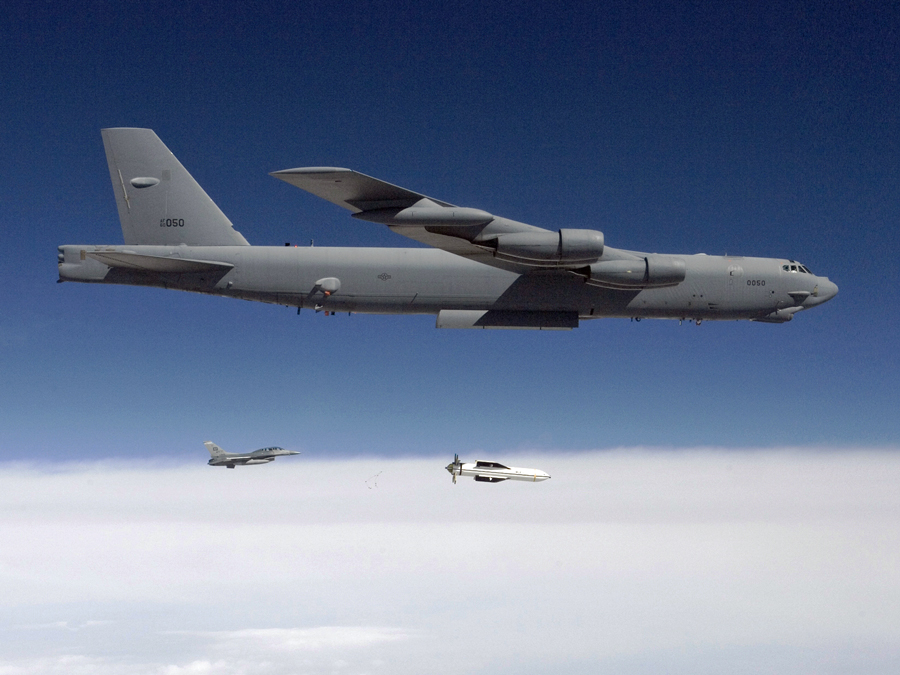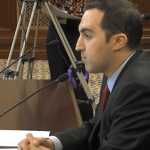by Jim Lobe
I’ve been slowly reading Robert Gates’ Duty over the last week or so and some of it is quite pertinent in light of the recent recommendation by JINSA’s Michael Makovsky and Lt. Gen. David Deptula (ret.) in the Wall Street Journal that the Obama administration provide Israel with Massive Ordinance Penetrator (MOP) bombs and B-52 bombers to deliver them against Iran’s nuclear facilities. Here’s what they wrote in their article entitled, “Sending a Bunker-Buster Message to Iran”, (echoed here by the Washington Post’s Jennifer Rubin):
By transferring to Israel MOPs and B-52Hs the administration would send a signal that its ally, which already has the will, now has the ability to prevent a nuclear Iran [a very dubious assertion, according to most experts]. Once they are delivered — ideally as the current six-month interim deal is set to expire in July — Iran will be put on notice that its nuclear program will come to an end, one way or another.
While Gates in his book (pp. 190-191] doesn’t say whether Israel requested the same weaponry in 2007, his description of the arguments presented, both pro and con, would certainly apply to Makovksy’s and Deptula’s arguments today. The passage is worth quoting in full, although the main point is summarized at the end when Gates quotes directly from what he told Bush in private. Here’s the passage as a whole:
Debate [about Iran’s nuclear program] heated up considerably in May [2007], prompted by several Israeli military requests that, if satisfied, would greatly enhance their ability to strike the Iranian nuclear sites. In a meeting with the Joint Chiefs and me in the Tank on May 10, in the middle of a conversation on Afghanistan, the president suddenly asked if anybody was thinking about military action against Iran. He quickly added that the goal was of course to prevent Iran from getting a nuclear weapons and that he “just wanted you to be thinking about it — not a call to arms.”
Two days later the national security team met with the president in his private dining room adjacent to the Oval Office. The participants included Cheney, Rice, Mullen, Bolten, Hadley, Hadley’s deputy Jim Jeffrey, and me. We addressed two questions: How do we answer the Israelis and what should we do about the Iranian nuclear program? In many respects, it was a reprise of the debate over the Syrian nuclear reactor the year before. Hadley asked me to lead off. When making my case to the president on a significant issue like this one, I always wrote out in advance the points I wanted to make, because I did not want to omit something important. Given Bush 43’s green light to Olmert on the Syrian reactor, I was very apprehensive as the meeting began.
I recommended saying no to all the Israelis’ requests. Giving them any of the items on their new list would signal U.S. support for them to attack Iran unilaterally: “At that point, we lose our ability to control our fate in the entire region.” I said we would be handing over the initiative regarding U.S. vital national interests to a foreign power, a government that, when we asked them not to attack Syria, did so anyway. We should offer to collaborate more closely with Israel, I continued, doing more on missile defense and other capabilities, “but Olmert should be told in the strongest possible terms not to act unilaterally.” The United States was not reconciled to Iran having nuclear weapons, but we needed a long-term solution, not just a one-to-three-year delay. I went on to say that a strike by the United States or Israel would end divisions in the Iranian government, strengthen the most radical elements, unify the country behind the government in their hatred of us, and demonstrate to all Iranians the need to develop nuclear weapons. I warned that Iran was not Syria — it would retaliate, putting at risk Iraq, Lebanon, oil supplies from the Gulf (which would lead to skyrocketing oil prices), and the end of the peace process, as well as increasing the likelihood of a Hizballah war against Israel. Addressing what I knew to be Cheney’s desire to deal with the Iranian nuclear program before Bush left office, I observed that our current efforts to isolate Iran, significantly increase their economic problems, and delay their nuclear program might not be successful in bringing about a change of policy in Tehran during the Bush presidency, but they would leave his successor a robust array of tools with which to apply pressure. Finally, I pointed out that the president’s own conditions for preemptive war had not been met, our own intelligence estimate would be used against us, and we would be the ones isolated, not Iran.
Cheney spoke next, and I knew what was coming. Matter-of-factly, he said he disagreed with everything I had said. The United States should give Israel everything it wanted. We could not allow Iran to get nuclear weapons. If we weren’t going to act, he said, then we should enable the Israelis. Twenty years on, he argued, if there was a nuclear-armed Iran, people would say the Bush administration could have stopped it. I interjected that twenty years on, people might also say that we not only didn’t stop them from getting nuclear weapons but made it inevitable. I was pretty sure Condi [Condoleezza Rice] did not favor accommodating Israeli’s requests, but the way she expressed her concerns about not leaving our ally in the lurch or feeling isolated led Mullen and me after the meeting to worry that she might be changing her mind. Mullen talked about the difficulty of carrying out a successful attack. Hadley remained silent. At the end, the president was non-commital, clearly frustrated by the lack of good options for dealing with Iran. He had a lot of company in the room on that score.
That afternoon I flew to Colorado Springs to celebrate the fiftieth anniversary of the North American Aerospace Defense Command. Aboard the plane, I became increasingly worried that the president might be persuaded by Cheney and Olmert to act or to enable the Israelis to act, especially if Condi’s position was softening. I decided to communicate once again with Bush privately. I said,
“We must not make our vital interests in the entire Middle East, the Persian Gulf, and Southwest Asia hostage to another nation’s decisions — no matter how close an ally. Above all, we ought not risk what we have gained in Iraq or the lives of our soldiers there on an Israeli military gamble in Iran. Olmert has his own agenda, and he will pursue it irrespective of our interests. …We will be bystanders to actions that affect us directly and dramatically. …Most evidence suggests we have some time. …The military option probably remains available for several years. …A military attack by either Israel or the United States will, I believe — having watched these guys since 1979 — guarantee that the Iranians will develop nuclear weapons, and seek revenge. …A surprise attack on Iran risks a further conflict in the Gulf and all its potential consequences, with no consultation with the Congress or foreknowledge on the part of the American people. That strikes me as very dangerous, and not just for sustaining our efforts in the Gulf.”
Most of that should act as a rebuttal to Makovsky’s and Deptula’s dangerous recommendations.






Didn’t Zbig Brzezinski say the US should shoot down any Israeli warplanes trying to use Iraqi airspace to attack Iran?
Great piece.
The last part is true today as it was then. Israel has proven it will do what it wants, that the U.S. can drop dead if it doesn’t like it. One has to ask who these people who advocate giving Israel the means to destroy Iran, “just whose side are you on”? It seems that Israel can attack its weak neighbors with impunity, but Iran, that’s a different story. And what effect will it have on the world economy? I seriously doubt that people in the U.S./E.U. are up to riding bicycles because they can’t afford the cost of fuel, if it’s even available.
I assume Obama made a deal with Israel that it does not attack Iran and Obama will not allow Iran to build nukes.
It does tend to confirm what I have long thought – that attacking Iran (without going nuclear) is beyond Israel’s capabilities. They don’t have big enough bunker-busting bombs, nor can their aircraft lift the gigantic ones that a B52 can. In addition, they have limited air-to-air refuelling capacity, another reason for wanting a B52. It’s one area where the USA has real leverage over the chickenhawks.
Israel cannot win. The question to be answered is: Should we also have to lose because of their intransigence. Who draws the line for our security??